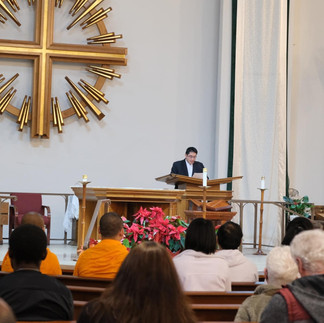From conflict to compromise
- Sith Chaisurote

- Mar 16, 2023
- 3 min read
MARTIN LUTHER KING, JR AND THE BUDDHIST TRADITION
By Sith Chaisurote founder of DHAMMAKAYA MEDITATION CENTER SILICON VALLEY

An Interfaith Gathering of the Interfaith Clergy Alliance and the
Interfaith Community of South County
January 15, 2023
St. Mary's Parish, Gilroy
Dr. King was a revolutionary activist who fought against injustice and viciousness of discrimination and segregation. His thinking created a paradigm shift in the society on racial equality. He worked to change hearts and minds of the people. Undoubtedly, when you challenge the status quo, you would face opposition, either with threatening words, legal actions, or violence.
In facing such opposition, Dr. King chose a path of nonviolence as we are often reminded of his words that Mayor Blankley (Mayor of Gilroy) had just mentioned,
"Darkness cannot drive out darkness; only light can do that. Hate cannot drive out hate; only love can do that. Hate multiplies hate, violence multiplies violence, and toughness multiplies toughness in a descending spiral of destruction."
What is most impressive about Dr. King, to me, is that he fought such injustice through nonviolent resistance like the sit-ins, the peaceful
demonstrations and he was successful in effecting changes with his approach.
I would like to draw a parallel between Dr. King's actions and that of the Buddha who was also a revolutionary activist of his time. He also caused a change in paradigm over 2,600 years ago. Back then, in ancient India, a caste system was an integral part of the society. As a part of the belief system in Brahminism, people were assigned to one of the Four Castes, also known as "Vannas". People were born into them and there was no social mobility. There are castes for:
ㆍPriests & Spiritual Leaders (who are closest to Brahmin)
ㆍKings, Aristocrats, Warriors (Ruling Class)
ㆍFarmers, Merchants, Bankers (people running the economy)
ㆍ Laborers, Servants
Upper castes were entitled to certain privileges. Castes also governed their behaviors. For example, people in the lowest class were prohibited from religious practice of the elites, and so they were prevented from spiritual enlightenment according to their belief. People were also discouraged from inter-marriage between the castes. Offspring of such inter-marriage was considered a group called "the Untouchable," who would be boycotted in the society. This caste system is inherently discriminatory. The Buddha spoke out against this
system. He did it in such a way that is peaceful.
Birth does not determine your spiritual enlightenment. Rather actions do.
Anybody adhering to the precepts can be ordained as monks and wear the saffron robes. And one of the most important precepts that monks must strictly follow is to do no harm to others, both in speech and action. The Buddha would basically disavow any disciples that have intentionally caused harm to others.So throughout history, we have peaceful monks who used to be kings, aristocrats, spiritual leaders, merchants, and servants. The Buddha's position is that everyone has a right to achieve spiritual enlightenment. It starts with the practice of meditation to purify the mind of all defilements which consist of greed, anger, and ignorance.
Our Meditation Master at Dhammakaya Temple in Thailand, Venerable Dhammajayo, once said,
"Inner Peace and Happiness can be achieved by those of any race, tradition, or creed who can still their mind at the center of the body."
Buddhists would celebrate the life of Dr. King by spreading our love and kindness to him. More specifically, we begin by recollecting the good deeds, or good karma, we have done. Through this exercise, we feel a sense of joy and happiness at the center of the body. Then we share this feeling much like the way we throw a pebble into a pond and let the water propagates and expands. We share this compassion and loving-kindness with all beings, first with people in this room, to people in Gilroy, in Santa Clara County, in California, in the US, and the world. We would especially dedicate our good deeds that we have done in our life with Dr. King and thank him for what he has done for a better society.








Comments